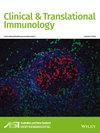Epigenetic regulation of inflammation by microRNAs in post-infectious bronchiolitis obliterans
Abstract
Objectives
Post-infectious bronchiolitis obliterans (PiBO) is a rare, chronic disease initiated by severe infection and followed by perpetuating inflammation and obliteration of the small airways. MicroRNAs (miRNAs) have been proposed to play a central role as epigenetic regulators, which control resolution and prevent the uncontrolled progress of inflammation. The aim of this study was to define biomarkers on the level of post-transcriptional gene regulation in order to characterise PiBO.
Methods
A total of 39 patients with well-defined PiBO and 31 controls from two centres, Barcelona, Spain, and Frankfurt, Germany, were analysed by next-generation sequencing (NGS). The evaluation of the biological targets of the miRNAs was performed by pathway enrichment analysis and protein–protein interaction network analysis respectively.
Results
Patients with PiBO had significantly lower lung function values and increased airway inflammation in induced sputum as indicated by total cell counts, neutrophils, IL-1β, IL-6, IL-8 and TGF-β compared to controls.
Next-generation sequencing analysis revealed a total of 22 dysregulated miRNAs, which passed significance threshold for Padj ≤ 0.001 with 17 being upregulated and 5 being downregulated. Of these dysregulated miRNAs, miR-335-5p, miR-186-5p, miR-30b-5p and miR-30c-5p were further validated using qRT-PCR. Interestingly, these miRNAs are functionally implicated in cytokine–cytokine receptor interaction, TGF-β signalling and FoxO signalling pathway and significantly correlated with lung function values (FEV1).
Conclusion
Our results demonstrate an aberrant miRNA expression profile in PiBO, which impacts pathways responsible for the regulation of inflammation and fibrosis. The defined miRNAs are useful biomarkers and should be assessed as potential target in the field of miRNA therapeutics.

 求助内容:
求助内容: 应助结果提醒方式:
应助结果提醒方式:


